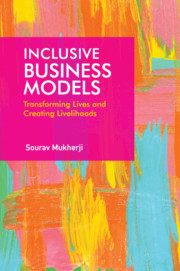Book contents
- Frontmatter
- Dedication
- Contents
- List of Tables
- List of Figures
- Preface
- Acknowledgements
- 1 Introduction
- 2 Vaatsalya Hospitals: Affordable Healthcare in Proximity
- 3 Gyan Shala: Providing Inclusive Education
- 4 Rang De: Creating a Platform for Social Investing
- 5 Labournet: Empowering Informal Sector Labourers
- 6 Selco: Inclusive Model for Energy Access
- 7 Hasiru Dala Innovations: Improving Lives of Waste Pickers
- 8 Reliance Retail: Creating Inclusive Supply Chain
- 9 International Development Enterprise (Ide) Nepal: Developing Smallholder Ecosystem
- 10 Ruralshores: Delivering Inclusive Service
- 11 Gujarat Narmada Fertilizer Company’s (Gnfc) Neem Initiative: A Social Business
- 12 Bringing it All Together
- References
- Index
9 - International Development Enterprise (Ide) Nepal: Developing Smallholder Ecosystem
Published online by Cambridge University Press: 31 July 2021
- Frontmatter
- Dedication
- Contents
- List of Tables
- List of Figures
- Preface
- Acknowledgements
- 1 Introduction
- 2 Vaatsalya Hospitals: Affordable Healthcare in Proximity
- 3 Gyan Shala: Providing Inclusive Education
- 4 Rang De: Creating a Platform for Social Investing
- 5 Labournet: Empowering Informal Sector Labourers
- 6 Selco: Inclusive Model for Energy Access
- 7 Hasiru Dala Innovations: Improving Lives of Waste Pickers
- 8 Reliance Retail: Creating Inclusive Supply Chain
- 9 International Development Enterprise (Ide) Nepal: Developing Smallholder Ecosystem
- 10 Ruralshores: Delivering Inclusive Service
- 11 Gujarat Narmada Fertilizer Company’s (Gnfc) Neem Initiative: A Social Business
- 12 Bringing it All Together
- References
- Index
Summary
In this chapter, we talk about the evolution of International Development Enterprise (IDE), a not-for-profit organization working in rural Nepal, and the impact that its various development initiatives have had in improving the socio-economic conditions of smallholder farmers. IDE raises funds from donor and philanthropic agencies and utilizes them to develop smallholder communities by creating livelihood opportunities.
IDE in Nepal evolved from being a supplier of technology for irrigation and water storage to becoming a critical enabler of a smallholder ecosystem that was sustainable and scalable. While the context of this case is rural Nepal, the socio-economic conditions of smallholder farmers are not very different from that of India and many other emerging nations where the lessons learnt from this case can be replicated. The advantages of developing and empowering economically underprivileged communities are well known. This case demonstrates the process of creating such communities and making them self-sustainable. It also highlights the critical role that various stakeholders, such as the government and development organizations, can play in enabling such communities to overcome their vulnerabilities.
IDE Nepal is one of the few cases in this book dealing with a not-for-profit organization. IDE by itself is not an example of an inclusive business model unlike most other cases described here. However, it enables the creation of inclusive businesses that is essential for developing and sustaining the smallholder ecosystem. IDE's case also helps us to understand the different ways in which a not-for-profit can create value for economically underprivileged communities when compared to inclusive business models. This is a theme that we will visit in greater detail in the concluding chapter of the book.
EVOLUTION OF IDE NEPAL
International Development Enterprise (IDE) is an organization that operates in 11 countries worldwide with the aim of creating income opportunities for poor, rural households in developing countries. Established in 1981 by a group of North American social entrepreneurs, IDE provides the rural poor in Asian and African countries with low-cost access to water for agricultural use and links them to markets so that their agricultural products can be sold profitably.
- Type
- Chapter
- Information
- Inclusive Business ModelsTransforming Lives and Creating Livelihoods, pp. 210 - 237Publisher: Cambridge University PressPrint publication year: 2021



